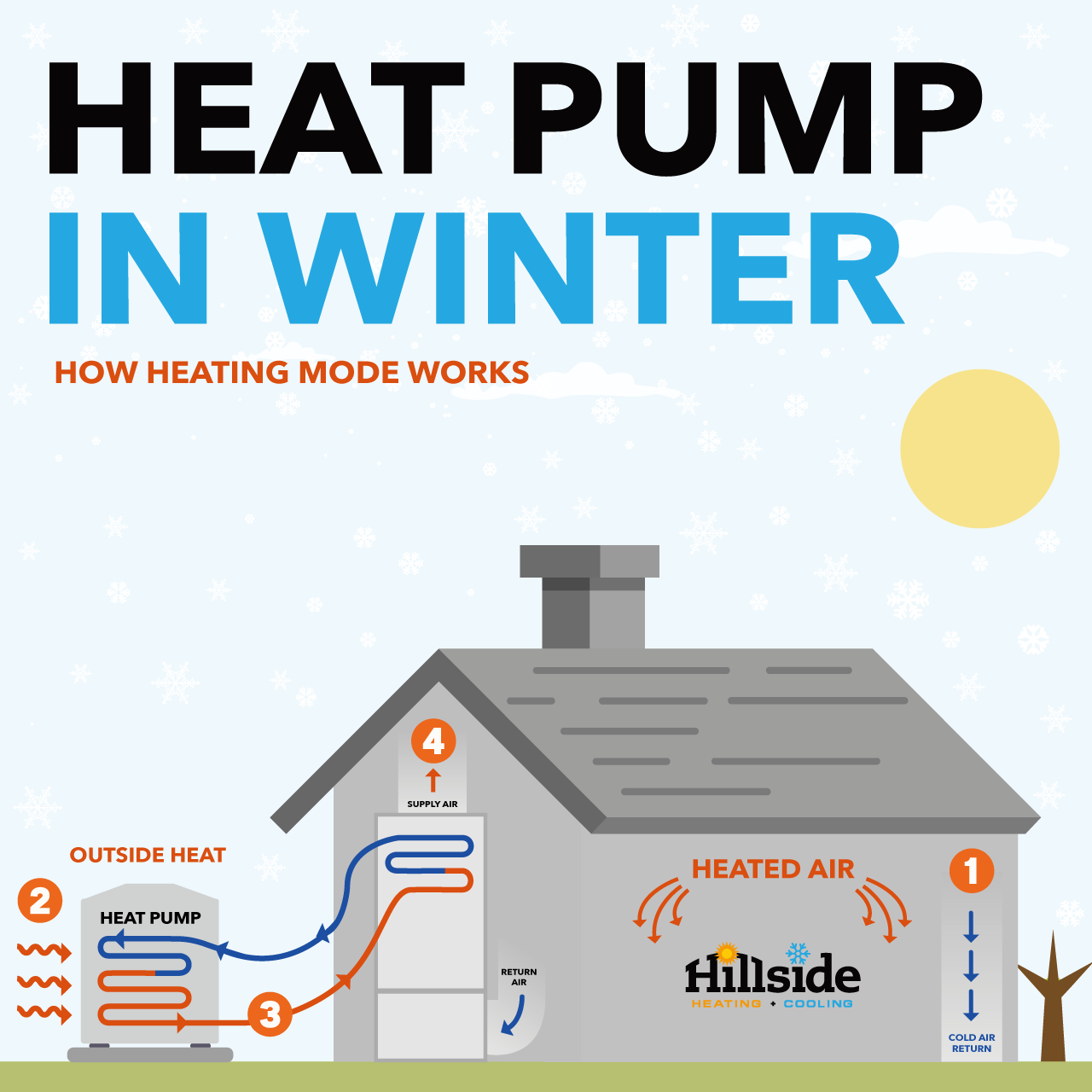Heat Pump Installation, Repair, and Maintenance In DE, PA, & MD
THE ALL-IN-ONE HEATING & COOLING SYSTEM
For over 70 years, Hillside has been the trusted, local expert for heat pump installation, repair, and maintenance services in Delaware, Pennsylvania, and Maryland.
We offer energy-efficient heat pump systems engineered for exceptional performance and durability. Our selection includes and services top brands such as Armstrong Air, Thermo Pride, Peerless, Mitsubishi, Rinnai, and other leading ductless systems.
Hillside’s technicians have the training, certifications, and knowledge to install, maintain and repair these HVAC systems. Whether you need installation, routine maintenance, or emergency repairs, you can trust us for all of your heat pump needs.
For a FREE QUOTE, call us at 302-738-4144 (DE&PA) or 410-398-2146 (MD). We’ll give you an HONEST ESTIMATE for any heat pump installation, repair, or maintenance service.
Heat Pump Services
This contact form does not substitute for a service call request. Please call our office 302-738-4144 or 410-398-2146. Thank You.
HEAT PUMPS
What is a Heat Pump?
A heat pump is an all-in-one cooling and heating system that comforts your home (and paws) year-round.
Given the moderate climate of New Castle, Delaware, Southern Chester County, Pennsylvania, and Cecil County, Maryland, heat pumps offer an energy-efficient alternative to traditional air conditioners and furnaces.
A heat pump offers several advantages, making it an excellent choice for heating and cooling your home:
- Energy Efficiency: Heat pumps are highly energy-efficient because they move heat instead of generating it. This can lead to lower energy bills compared to traditional heating systems like furnaces.
- Dual Functionality: Heat pumps provide both heating and cooling, eliminating the need for separate systems. This versatility simplifies home climate control throughout the year.
- Consistent Comfort: Heat pumps maintain consistent indoor temperatures and humidity levels, enhancing overall comfort. They often have advanced features for precise temperature control.
- Quiet Operation: Many heat pumps operate quietly, contributing to a more peaceful home environment compared to conventional HVAC systems.
- Longevity and Low Maintenance: With proper maintenance, heat pumps can have a long lifespan and require less frequent repairs, making them a reliable option for homeowners.
- Increased Home Value: Installing a heat pump can enhance your home’s energy efficiency and appeal, potentially increasing its market value.
How long does a heat pump last? Hillside expertly installs heat pumps in DE, PA, and MD, with an average lifespan of around 15 years. However, several factors can influence the longevity of your heat pump, including the make and model, usage rate, and maintenance history. Our HVAC professionals at Hillside can help extend the life of your heat pump or air conditioning system through our annual tune-up services.
Overall, heat pumps provide an efficient, eco-friendly, and comfortable solution for managing your home’s heating and cooling needs.
For an honest and FREE estimate on heat pump repair, service, or installation, call us at 302-738-4144 (DE & PA) or 410-398-2146 (MD).
How Do Heat Pumps Work?
A heat pump uses the outside air to heat and cool your home. In heating mode, the heat pump extracts outside heat and transfers it into your home. In cooling mode, the directions are reversed by removing heat from your home and performing like a traditional air conditioner. Heat pump only moves heat rather than generating heat.
It consists of two main components: an indoor air handler and an outdoor heat pump, similar to a central air-conditioning unit.
Cooling Mode: When you want to cool your home on hot days, the heat pump operates like a central air conditioner. It absorbs heat from inside your home and expels it outdoors, lowering the indoor temperature.
Heating Mode: On cold days, the process reverses. The heat pump absorbs heat from the outside air, even in chilly temperatures, and delivers it indoors to warm your home. A heat pump can also be coupled with a gas furnace in a dual-fuel system for added efficiency during extreme cold.

Heat Pump vs Furnace
The main differences between a heat pump and a furnace lie in their operation, energy source, efficiency, and applications. Here’s a breakdown:
Operation:
- Heat Pump: A heat pump transfers heat between the inside and outside of a building. In heating mode, it extracts heat from the outdoor air (or ground) and moves it indoors, even in cold temperatures. In cooling mode, it operates like an air conditioner by absorbing indoor heat and expelling it outside.
- Furnace: A furnace generates heat by burning fuel (natural gas, oil, or propane) or using electricity to heat air, which is then distributed throughout the home via ductwork.
Energy Source:
- Heat Pump: Uses electricity to move heat. It can be more efficient in moderate climates because it relies on transferring heat rather than generating it.
- Furnace: Typically uses fossil fuels (like natural gas or oil) or electricity to produce heat directly.
In summary, heat pumps are energy-efficient systems that provide both heating and cooling by transferring heat, while furnaces generate heat by burning fuel or using electricity. The choice between the two often depends on climate, energy availability, and specific heating needs.
Heat Pump vs Central Air
The main differences between a heat pump and central air conditioning lie in their operation, heating capabilities, and applications. Here’s a breakdown:
Operation:
- Heat Pump: A heat pump functions as both a heating and cooling system. It transfers heat between the indoors and outdoors, extracting heat from the outside air to warm your home in winter and expelling indoor heat to cool your home in summer.
- Central Air Conditioning: Central air conditioning systems are designed solely for cooling. They absorb heat from inside the home and expel it outside, lowering indoor temperatures.
Heating Capabilities:
- Heat Pump: Often has a higher efficiency rating than a furnace, especially in moderate climates, as it can deliver more energy in heating or cooling than it consumes in electricity (measured as a coefficient of performance, or COP).
- Furnace: Efficiency is measured as an Annual Fuel Utilization Efficiency (AFUE) rating, which indicates how much fuel is converted into usable heat. While modern furnaces can be quite efficient, they still generally consume more energy than heat pumps to produce the same amount of heat.
Heat pumps are highly adaptable systems that offer both heating and cooling capabilities, making them ideal for year-round climate control. In contrast, central air conditioning systems are designed exclusively for cooling, meaning homeowners must rely on alternative heating solutions, such as gas or oil furnaces, electric heaters, or heat pumps, to ensure comfort during the colder months. This separation of functions highlights the practicality of heat pumps as a comprehensive solution for managing indoor temperatures year-round.
- Modern Energy-Efficient Products
- Exceptional Customer Service
- Fast and Flexible Scheduling
- Up-Front and Fair Pricing
- Industry Leading Warranties
- Excellent Service and Maintenance Plans
- Courteous and Professional Technicians
- Over 70 Years of Industry Expertise
THE TRUSTED COMFORT EXPERTS OF DE, MD, & PA

Proudly Serving New Castle County, DE, Cecil County, MD and Southern Chester County, PA.

302-738-4144 (DE & PA) 410-398-2146 (MD)
WE LOVE OUR CUSTOMERS
All of our work is guided by three generations of family attitudes and values – respect, loyalty, integrity, accountability, honesty, kindness. We pride ourselves on building excellent relationships with our customers, some of whom we have served for decades, and then gone on to serve their children for decades. Above all, we know what it’s like to be a customer and how we’d like to be treated.
That’s why we’re so honored to have received thousands of glowing ratings, reviews, recommendations, and testimonials from our heating and cooling customers. It means the care we put into our work shows through, and that we truly are doing customer service right.